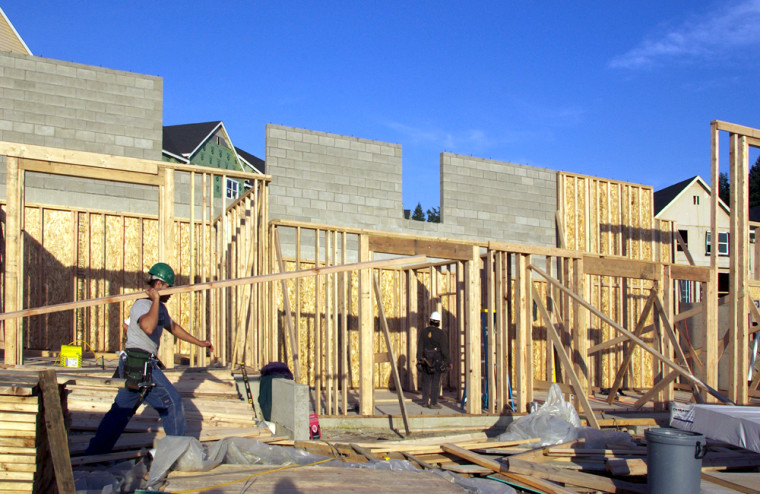Evidence is mounting that the red-hot housing market reached a peak last summer, with sales and construction activity beginning to slow even more than would normally be expected this time of year.
But so far industry analysts expect only a modest decline in activity in 2006 and say prices should continue to rise in most markets, although not at the double-digit rates of recent years.
“The boom is obviously winding down,” said David Lereah, chief economist for the National Association of Realtors. “But it’s important to note that it’s winding down to still-healthy levels of activity. … We’re not seeing anything fall out of bed.”
The Realtors group reported this week that its pending home sales index, based on contracts signed in November, fell for a third straight month, with the sharpest decline seen in the West, home to some of the markets that long have been considered the most overheated.
Other indicators also signal a slowdown in housing, which has been one of the biggest contributors to economic growth in recent years:
- Single-family home sales, including new and existing homes, fell in November to their lowest level since March.
- Inventories of unsold new homes have risen to record levels, and existing-home inventories are rising as well.
- Applications for mortgages to buy homes fell 16 percent in December.
- A housing market index compiled by builders fell in December to its lowest level in more than two years.
Richard DeKaser, chief economist for National City Corp. in Cleveland, said the national housing market appears to have peaked over the summer, “and we have seen a subsequent decline. “
“The decline so far has been very mild,” he said. “Certainly the bottom has not fallen out — at least not yet.”
Housing industry analysts say strong economic fundamentals including a growing economy, employment growth and rising population should support a modest increase in home prices this year in the vast majority of markets.
But they point to two major risks that could deflate the housing bubble in a big hurry: Rising mortgage rates and selling by speculators.
Rates on 30-year fixed mortgages, the most popular variety, have risen steadily from about 5.6 percent in June to 6.2 percent currently. Most analysts expect the rate to rise only about another half-percentage point this year, based in part on the consensus view that the Federal Reserve is almost finished raising short-term rates.
Although a 30-year rate of 6.7 percent would be well above the 5.8 percent average of the past three years, it would still be relatively low by historical standards.
The darker scenario is that long-term rates would rise more sharply, perhaps because of a severe spike in inflation or an unexpected flight of foreign investors, who currently keep rates low through their heavy buying of U.S. Treasury bonds.
“I don’t think it will happen, but it’s certainly not something to be dismissed,” said DeKaser.
The risk from speculators is equally hard to assess.
David Berson, chief economist for mortgage giant Fannie Mae, said housing demand from investors for second homes, rental or speculative “flipping,” has been an important factor pushing up prices in hot markets like south Florida, Las Vegas and Phoenix. He expects that demand to decline dramatically in 2006, and as a result is looking for average home price gains of only 3 percent this year, compared with about 12 percent in each of the past two years.
“It looks like at end of the year investors were starting to pull out of some markets,” Berson said in a conference call with analysts and reporters this week. “We’re not looking at a housing sale recession, but enough of a slowdown to give some downward push to prices.”
With investor interest in housing at record levels, Berson and other industry economists said they are concerned about a potential sell-off, especially if mortgage rates rise suddenly.
“Investor activity is by far the biggest risk that the housing sector is going to face this year,” Lereah said in the conference call. “We’re basically in uncharted territory, and there is a risk that the investor share could really come down significantly in some of our very hot markets.”
Lereah said highly leveraged investors who funded their home purchases with interest-only mortgages could face a tough economic decision on when to sell.
Dave Seiders, chief economist of the National Association of Home Builders, said the risk is that a sell-off “could feed on itself.”
“The danger would be if investors move those units back onto the market in large volumes that could create a much deeper problem,” he said. “If it goes haywire, it’s not just the housing sector that would get messed up it’s really the whole economy because of the support that the whole economy gets from home equity.”
Mark Zandi, chief economist for Moody’s Economy.com, said in an interview that housing prices could decline 5 to 10 percent in some of the hottest markets this year. But he said it could take until the end of the year so see that kind of weakness because sellers are generally very reluctant to lower their prices, especially after the years of rapid growth.
“It’s going to take a while before the expectations of buyers and sellers shift,” he said.
